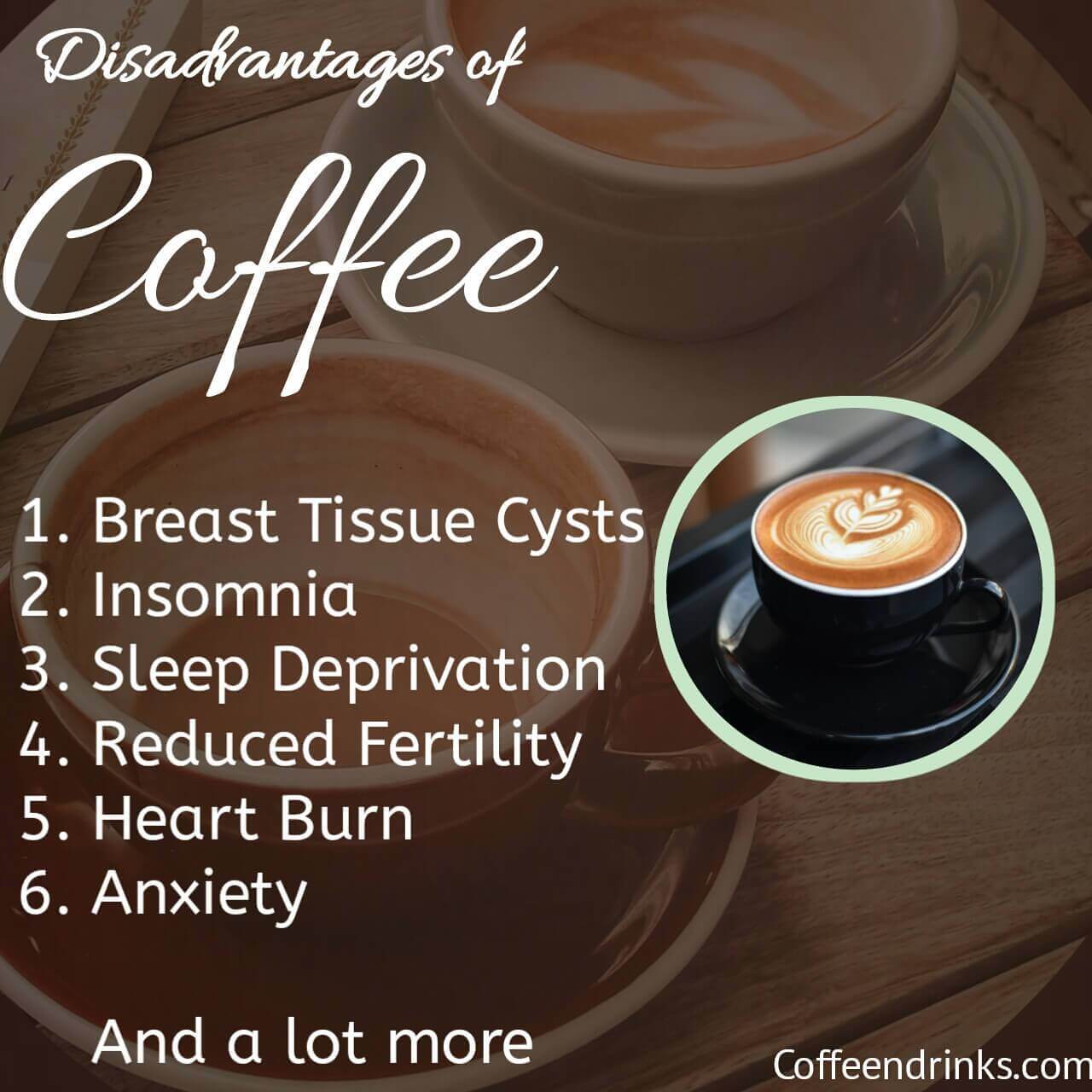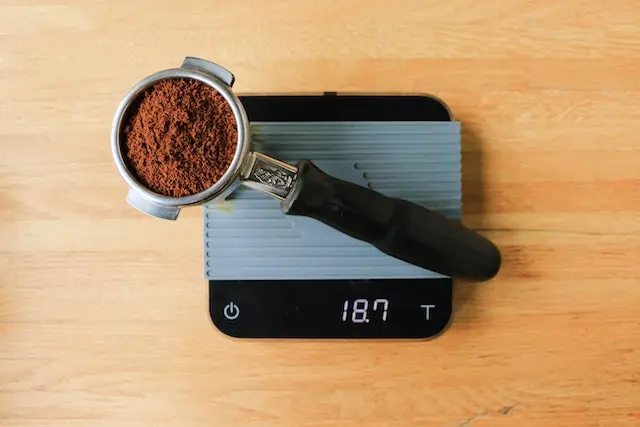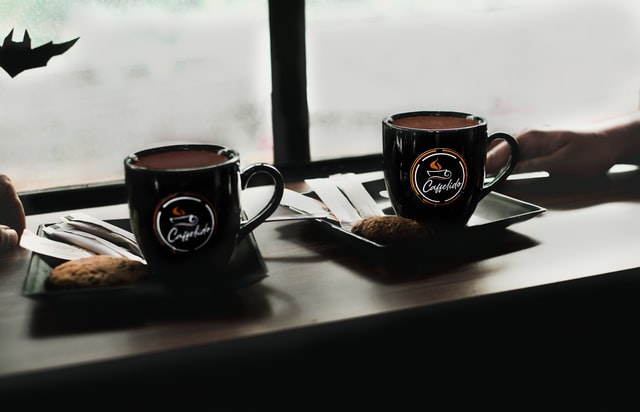What are the Disadvantages of Coffee Drinking?

Contents
Coffee on average is being consumed by 30-40 percent of the World’s population. Coffee can be used as a beverage, chocolate, skincare product, and many more. The average consumption for the year 2020/2021 has been recorded as 166.63 million 60 kilogram bags of coffee. Caffeine is the world’s most commonly consumed psychoactive substance, it directly affects the central nervous system of a person, thanks to that there are several disadvantages of coffee drinking too. It functions by acting upon the CNS(Central Nervous System) as a stimulant that results in a reduced feeling of tiredness and fatigue.
Disadvantages of Coffee Drinking?
A major issue observed in coffee consumers is that they get too addicted to the caffeine present in coffee. As a result, it becomes very difficult for an individual to let go of the habit of consuming coffee. The majority of coffee consumers prefer to have coffee as a beverage, a drink made by brewing coffee beans. Consumption of coffee occasionally is not harmful but, one must make sure that it doesn’t turn into an addiction. One of the most common symptoms of coffee addiction is considered as, the inability to perform daily routine activities without caffeine intake.

It has been observed that an addict finds it hard to stay put without consuming coffee daily even if in mild concentrations. Caffeine addiction just like any other addiction is very hard to be left behind. One finds it rather hard to let go of the addiction he or she has developed towards coffee thus, leading them back to the consumption of caffeine one way or another. According to a health report, coffee consumption comes along with various side effects such as sleep deprivation, anxiety, depression, stomach aches, problems related to cardiovascular, bodily pain, shifted concentration, nervousness, acid reflux, and many more. Various of the above-mentioned side effects could cause heavy damage to one’s mental health, social life, and relationships, something that one cannot afford to lose.
The report also states that effects are found to be even more dangerous for adults and youngsters. As earlier stated caffeine stands to be very similar to other know drugs, our body can get used to it as a result our body would require a higher caffeine intake with passing time. As a result of this, the effects we talked about could get worsened. The concentration of caffeine in a pack of coffee varies depending upon the brand and type of coffee that you consume, but a typical cup of filter coffee is said to consist of an approximate 95g caffeine/cup.
Also Read 15 Health Benefits of Drinking Coffee
The Journey of Withdrawal
Given the scenario that a person wishes to give up his/her coffee addiction, then the reactions to the process of withdrawal are not easy themselves. For a body that is used to a daily intake of caffeine and is dependent on the same, reactions are said to kick in after 12-24 hours of stopping the consumption of caffeine. There are 8 common reactions to the withdrawal of coffee consumption, that includes of headache, fatigue, anxiety, difficulty in concentrating, low energy, depressed feeling, tremors, and irritation.
As earlier discussed caffeine affects the brain and as we begin withdrawing the use of caffeine, it causes an increase in blood flow to the brain, which can lead to headaches for some people, and as we know that coffee acts as a stimulant to the human body, letting go of coffee intake can make certain people feel drowsy and tired. Another change observed upon withdrawal is that it affects the body not just in a physical manner but psychologically too, leading to feelings of anxiety, tiredness, and anger. According to observation caffeine significantly increases the levels of certain neurotransmitters and hormones. Cutting back on caffeine consumption can cause you to have difficulty focusing on specific tasks, coffee also leads to an increase in alertness and can boost feelings of well-being. For regular caffeine consumers, cutting it out may lead to a depressed mood. Like upon addiction to drugs certain people observe hand tremors, hand tremors may be also observed upon either withdrawal or overdose.
How Caffeine Works?
Caffeine has a very unique way of working upon a human body, it has a fixed journey that it follows once it enters the body. This unique way includes caffeine being directly absorbed from the gut into the bloodstream, followed to the Liver. From there it’s broken down into several compounds leading to their transfer in various organs, in this very manner caffeine reaches different organs of the human body affecting them and their functions. With that being said as discussed earlier caffeine majorly affects the brain, it does so by blocking the effects of adenosine. Adenosine is a neurotransmitter that relaxes the brain and gives you a sense of tiredness, it keeps on growing as the day goes by as a result by the end of the day you feel exhausted but coffee as a result of the caffeine content keeps the person awake resulting in suppression of effects of adenosine. Given that coffee affects the brain it is often referred to as a psychoactive drug. Once been consumed, caffeine tends to exert its effects quickly.
Some Other Disadvantages of Coffee For the Coffee Lovers
The effects of coffee consumption have been controversial over the years. Other consumables such as soft drinks, tea, and chocolates all contain caffeine yet the biggest source of caffeine remains coffee. Across numerous studies, it has been found that caffeine can lead to a short-term boost in brain function improving mood, reaction time, vigilance, and general cognitive function. Other than the mentioned negative aspects of coffee some of the other aspects include the probability that one’s coffee is of a bad quality, bad quality coffee is considered to be toxic. A bad quality coffee could consist of tons of impurities, something that isn’t good for anyone’s health. This could be the case given your coffee is made up of beans that have been over ripped or ruined, a single over ripped bean could be the reason your coffee is toxic. The most prominent way to prevent this would be to buy higher-priced coffee beans and not cheap or unbranded beans.
A deadly disadvantage of coffee is that it could be lethal and end up killing you. Drinking around 80-100 cups of coffee in a short session could be lethal, this amount of coffee would include almost 10-13 grams of caffeine an amount enough to be the reason for someone’s death. This scenario is not an ideal one as this much of an overdose cannot be observed in human nature.
Coffee as stated could be responsible for keeping you awake, and in cases of youngsters such as students or office workers in their 30’s are the ones who consume coffee more than others. Insomnia is a common sleep disorder that makes it hard to fall asleep or to stay asleep.

Coffee consumption could be one of the reasons for this disorder, the maximum level of caffeine intake suggested by medical experts is 400 milligrams the amount that one would probably reach after consuming 4 cups of coffee. Caffeine is a consumable that does not suit well to everyone, some people are caffeine intolerant ( caffeine sensitive) and thus they should be self-aware about the amount of caffeine that they can intake. The amount of caffeine that one can consume can be determined from his/her DNA. An exceptional case would be given the scenario that you are pregnant, expecting a baby. As caffeine is a consumable that gets absorbed into the bloodstream, the caffeine concentration would not just harm the mother’s health but would harm the fetus’s life. A fetus is extremely sensitive especially to psychotic drugs like caffeine and hence doctors suggest not intake any caffeine during this period but given that you are a heavy consumer of caffeine then if not quit one would suggest that you reduce it to one cup a day.
Cholesterol is a condition that can be observed in a considerable percentage of the world population. A high cholesterol patient is recommended to go only for filtered coffee, the reason being the two ingredients found in a coffee bean. Cafestol and Kahweol, are responsible for the rise in LDL cholesterol levels. Filtering the coffee would result in the trapping of most of LDL. LDL can be found in other types of coffee such as espresso, Turkish coffee, French press, and Scandinavian style. Kids who have been allowed to consume coffee at young ages have been found to wet their beds more often and at a higher rate as compared to other kids of the same age specifically children aged 5-7 years old.
Heartburn or Acid reflux is a condition that could worsen upon consumption of coffee or any form of caffeine and thus, it is suggested that one shall stop drinking coffee or try to reduce the concentration.

According to a study report by Harvard Medical School, it has been noticed that caffeine cannot be responsible for the prolonged increase in blood pressure. An increase in the blood pressure due to the effect of caffeine is not observed to stay for longer periods. Coffee consumption has been often interlinked with hypertension. Hypertension is a condition that affects the mental health of individuals increasing levels of blood pressure. Severe headache or migraine is observed to be caused due to regular consumption of caffeinated beverages. Caffeine consumption has even been held responsible for reduced fertility. Another disadvantage of coffee is that people with problems relating to Blood sugar are to avoid consumption of coffee because coffee has led to both an increase and a decrease in blood sugar levels. Coffee can change the way a diabetic patient processes sugar thus, is to be taken carefully. According to a medical report, it was found that coffee could lead to the prevention of conception and could even lead to miscarriages. A doctor working with the Association for Women’s Healthcare said and quote ‘ No actual method has been elucidated as to why excessive caffeine consumption has been shown to reduce fertility.’
Skin reactions upon coffee consumption
Disadvantages of Coffee also include reactions in and on the skin. It is a well-known scientific fact that coffee is responsible for dehydration that further leads to the building up of toxic compounds within the body itself. A concern has been raised regards the thinning of bones due to coffee. This could be explained as follow: Coffee is said to be responsible for excess removal of calcium out of the body thus, the necessary amount of calcium is missed upon by the body being the reason for weakened bones. These compounds have an effect on the skin, experts have often suggested that too much coffee can result in wrinkled skin prior to its maturity time and would be lax as time passes. If you are a latte or cappuccino lover and prefer it over others, then it could be the dairy that is affecting your skin. Dairy products such as milk block the production of sebum in the body and glue dead cells together. Besides this, the signs of aging, acne, or rosacea could be a response to the sugar in your cup of coffee. Health and diet-conscious individuals are often seen drinking only black coffee if they have an urge for coffee, the reason being black coffee is said to have lesser calories as compared to the other types and hence more cups of coffee could even be the reason behind your increasing weight.
The Bottom Line
Based upon all the data, facts, and effects stated above, the bottom line is that consumption of caffeine or coffee in any form may not be harmful necessarily but it could turn to be catastrophic given that you get addicted to the caffeine content present in coffee. Coffee may make you feel relaxed and refreshed but its side effects and disadvantages are something to be kept in mind as well. One should not ignore the disadvantages of coffee that are stated above cause it could be fatal if the same amount of consumption prevails even after several reactions. It would be outrageous for him/her to not respond to the scene with proper help and support for reducing their intake.
Frequently Asked Questions (FAQs)
1. How much caffeine is present in a single cup of coffee?
Answer: Caffeine content in a cup of coffee could vary from the other, though a standard cup of coffee ( around 250 ml) would have an average of 94.8 milligrams of caffeine. Whereas the caffeine content in a single espresso would be approximately 63 milligrams. The caffeine content in a cup of coffee could vary upon the factors such as the size of the cup, strength, and type of coffee in use.
2. For how long does caffeine last in coffee?
Answer: Caffeine at an approximate is said to last for 4-6 hours, and then the effects of caffeine are cut to half. This half-life reduces to 3 hours given that the consumer is a smoker. This implies that half an hour after the caffeine has kicked in, it would take roughly around 5 for its effects to be cut to half. This is the reason why many consumers feel the need for a second cup.
3. How can someone decaffeinate a coffee?
Answer: There are a few processes through which one can decaffeinate coffee, but even after decaffeination traces of caffeine are still present even if in the mildest concentrations. Generally, it is the percentage of 0.1-0.3. Every decaffeination process takes place whilst the beans are green or unroasted. There are two types of processes solvent and non-solvent. The Swiss Water method is one of the few processes, it is a process that relies on osmosis and solubility to remove caffeine from coffee beans. It begins with the soaking of beans into hot water followed by the carbon dioxide process. During this process, liquid carbon dioxide is forced into the beans for extracting the caffeine content.


